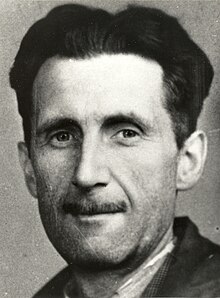George Orwell
Eric Arthur Blair (25 Juin 1903 – 21 Januar 1950),[1] that uised the pen name George Orwell, wis a Breetish novelist, essayist, jurnalist an creetic, that's wark is chairacterised bi lucid prose, awaurness o social injuistice, opposeetion tae totalitarianism, an ootspoken support o democratic socialism.[2][3][4]
| George Orwell | |
|---|---|
 Orwell's press caird portrait, 1943 | |
| Born | Eric Arthur Blair 25 Juin 1903 Motihari, Bengal Presidency, Breetish Indie |
| Dee'd | 21 Januar 1950 (aged 46) Varsity College Hospital, Lunnon, Ingland, UK |
| Restin place | Sutton Courtenay, Oxfordshire, Ingland |
| Pen name | George Orwell |
| Thrift | Novelist, poleetical writer an jurnalist |
| Alma mater | Eton College |
| Genre | Dystopia, roman à clef, satire |
| Subject | Anti-fascism an anti-Stalinist left, democratic socialism, leeterary creeticism, news, polemic |
| Years active | 1928–50 |
| Spoose | Eileen O'Shaughnessy (1935–45, her daith) Sonia Brownell (1949–50, his daith) |
| Signatur |  |
As a writer, Orwell produced leeterar creeticism an poetry, feection an polemical jurnalism; an is best kent for the allegorical novella Ainimal Ferm (1945) an the dystopian novelle Nineteen Aichty-Fower (1949). His non-feection warks, includin The Road tae Wigan Pier (1937), documentin his experience o wirkin-cless life in the north o Ingland, an Homage to Catalonia (1938), an accoont o his experiences sodgerin or the Republican faction o the Spaingie Ceevil War (1936–1939), are as creetically respectit as his essays on politics an leeteratur, leid an cultur. In 2008, The Times ranked George Orwell seicont amang "The 50 greatest Breetish writers syne 1945".[5]
Orwell's wark remeens influential in popular cultur an in political cultur, an the adjective "Orwellian" – descrivin totalitarian an authoritarian social practices – is pairt o the modren leid, lik mony o his neologisms, such as "Big Brither", "Thocht Police", an "Hate week", "Room 101", the "memory hale", an "Newspeak", "dooblethink" an "proles", "unperson" an "thochtcrime".[6][7]
See forby
eedit- Notes on Nationalism -- an essay scrieved bi Orwell.
References
eedit- ↑ "George Orwell". UCL Orwell Archives. Archived frae the original on 27 Februar 2009. Retrieved 7 November 2008.
- ↑ "Why I Write" in The Collected Essays, Journalism and Letters of George Orwell Volume 1: An Age Like This 1945–1950 p. 23. (Penguin)
- ↑ Orwell, George (1968) [1958]. Bott, George (ed.). Selected Writings. London: Heinemann. p. 103. ISBN 978-0435136758.
Every line of serious work that I have written since 1936 has been written, directly or indirectly, against totalitarianism and for democratic socialism, as I understand it. [italics in original]
- ↑ Gale, Steven H. (1996). Encyclopedia of British Humorists: Geoffrey Chaucer to John Cleese, Volume 1. Taylor & Francis. p. 823.
- ↑ "The 50 greatest British writers since 1945". The Times. 5 Januar 2008. Retrieved 7 Januar 2014.
- ↑ Robert McCrum, The Observer, 10 May 2009
- ↑ "Home : Oxford English Dictionary". www.oed.com. Retrieved 2 September 2017.